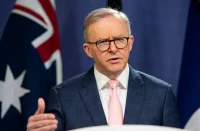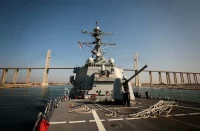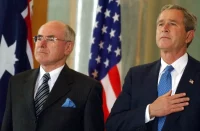Turkey’s foreign policy is going through a fiasco. The leader of the opposition Republican People’s Party even accused the country’s foreign minister of “narrow-mindedness” on live television. A scandal erupted after RPP MPs from were prevented from inspecting a Syrian refugee camp.
In 2009, Turkish Prime Minister Ahmet Davutoğlu, who at the time was serving as an advisor to the prime minister, proposed the idea of “zero problems with neighbors.” Turkey actually began improving relations with its neighbors and even attempted to establish relations with Armenia. That, however, didn’t work — Yerevan reminded Turkey of its mandatory precondition that the 1915 genocide be acknowledged.
On the other hand, relations with Azerbaijan, Iran, Iraq and Syria went through a truly “golden age.” The wives of the Turkish and Syrian leaders even sunbathed and swam together near Bodrum, Turkey’s most glamorous resort town, which is located at the junction of the Aegean and Mediterranean Seas.
However, the idyll couldn’t last for long. The fact is that “zero problems” was a slogan for foreign consumption from the very beginning, while unspoken neo-Ottomanism lay at the heart of Davutoğlu’s policy. It essentially boiled down to establishing a “big brother — little brother” relationship with the developing countries that were formerly part of the Ottoman Empire.
Turkey would naturally take the role of elder brother in each case. That it was possible and even natural to form a community under Turkey’s auspices was explained by saying that “all of these countries share a common geography and historical destiny.” In other words, they should be nostalgic about the Ottoman past.
The Ottoman Empire has been represented as an almost perfect community of nations to the Great Turkic States that both Prime Minister Erdoğan and Minister Davutoğlu talk about (and that, incidentally, is perhaps the only thing the two politicians have in common: Davutoğlu is said to be a faithful follower of Fethullah Gülen, a notorious Muslim cleric who has a very complicated relationship with the current regime in Ankara). The harmony between them, as the official ideology suggests, was disrupted only by the intrigues of the Western powers and Russia. But the fact that “the targets of neo-Ottomanism” may see history in a different light was evidently not considered.
The neighboring countries proved disappointing in various ways. Iran openly called the NATO radars in Turkey priority targets for missile attacks in the event of a large-scale conflict with Israel. Iraq had a whole list of grievances: raids by Turkish troops on its territory, Turkey’s political and economic penetration of the Kurdish Autonomy, its harboring of Iraq’s fugitive deputy prime minister, and its flirtation with Iraqi Turkmens behind the back of the authorities in Baghdad.
Not everything went smoothly even with Azerbaijan; it refused to sell its energy products to Turkey at prices that would please only Turkey. By and large, Turkey was unable to reach a condition of “zero problems.” What it got wasn’t “zero problems with neighbors” but “zero neighbors without problems.”
And then Syria went haywire. Ankara came to accept the unacceptable: Assad’s days are numbered, and Turkey felt an urgent need to take under its wing his disparate opponents, who would soon come to power and form a new, pro-Turkish government out of gratitude. And that would be the first step to a “neo-Ottoman” conglomeration. Plus, it would enable Turkey to “maintain order” in the Kurdish regions on its borders, where people sympathize with and sometimes even assist the separatists in Turkey, and allow it to gain control of a nice section of the Mediterranean coast where new gas and oil pipelines will sooner or later snake their way.
“Brother” Assad became the enemy, Emine Erdoğan (most likely) took down the beach photos of her recent girlfriend and put them in the bottom drawer of her escritoire, and hospitable Istanbul began hosting all sorts of conferences and forums for the opponents of Syria’s regime. Demands began sounding to establish no-fly zones for Syrian aircraft outside Damascus’s control — essentially demands to occupy part of a sovereign state. The further things go, the worse they get.
The press began publishing articles about Turkish officers captured by the Syrian military and weapons deliveries to the rebels through Turkish territory, and about fighters receiving training in border regions and even in Istanbul prior to entering Syria. Ankara strongly denied all of them.
Apparently in an attempt to hasten things along, Turkey’s leaders essentially committed a provocative act by sending a military reconnaissance aircraft to the coast of Syria. The Syrians shot it down, and Turkey’s leaders made angry speeches, insisting that the incident had occurred over neutral waters. When the accumulated evidence began showing that the F-4 was shot down in Syrian airspace, the claims about neutral waters were forgotten, and they asserted that Syria has no right to shoot down foreign military aircraft in its airspace.
Meanwhile, Assad was holding on, and to Ankara’s bewilderment his Western opponents preferred staying with angry rhetoric and sending arms and ammunition to the rebels. The aircraft was “forgotten.”
Meanwhile, refugees have been flooding into Turkey (more than 80,000 already). Tent cities were quickly set up near the border, and schools were refurbished. It was soon found that hardly all of the refugees were civilians fleeing “from the atrocities of a cruel regime,” as the pro-government press initially tried to show.
The local residents admitted to the journalists flooding the border strip that they’re afraid to go out in the evenings now, and many of those living in the camps openly admit in interviews with Turkey’s central newspapers (Vatan, Sabah) that they just rest during the daytime and go to Syria at night to fight government troops. It turns out that, as with the aircraft, the Turkish authorities were either dissembling or didn’t know everything that was going on. The latter seems unlikely, however.
Relations with Iran, which openly supports the Assad regime, are about as bad as they can get, but Davutoğlu’s proposal to “isolate Russia” on the Syrian issue has puzzled Moscow, to put it mildly.
On top of that, the separatist Kurdistan Workers’ Party began showing an unprecedented level of activity: A wave of high-profile attacks on army and police units, the kidnapping of a member of parliament and, finally, an operation to establish a “liberated region” in the southeast shocked both the public and the government.
Few doubt that there is a connection between Turkey’s growing Kurdish problem and the events in Syria (Damascus’s granting of actual independence to the Kurdish provinces, in particular).
And finally, the RPP’s call for non-interference in Syria’s internal affairs and support for negotiations between the rebels and al-Assad was like a bolt from the blue. An RPP spokesman even publicly asked rhetorically: “Isn’t Turkey’s prime minister to blame for the bloodshed in Syria?” That was something new in Turkish politics. Fierce domestic policy debates are normal for the country, but its foreign policy traditionally has the approval of the opposition parties, as well.
In a recent public opinion poll published by the influential Milliyet newspaper, 67% of respondents didn’t support the government’s policy on Syria. Only 18% of those polled liked it. The number of people who would vote for the party in power if elections were held today has declined by 7% since the beginning of the year. But the potential base of the Turkish (Nationalist Action Party) and Kurdish (Peace and Democracy Party) nationalists has grown. That’s a wake-up call for those in power!
Source: New Eastern Outlook














Comments